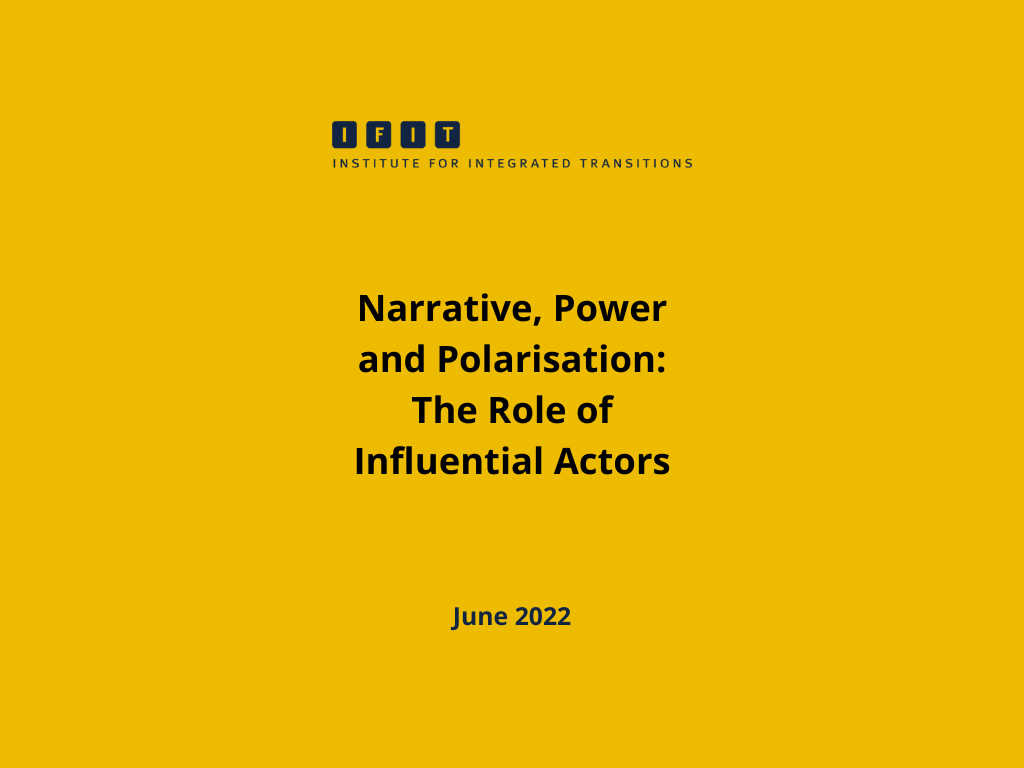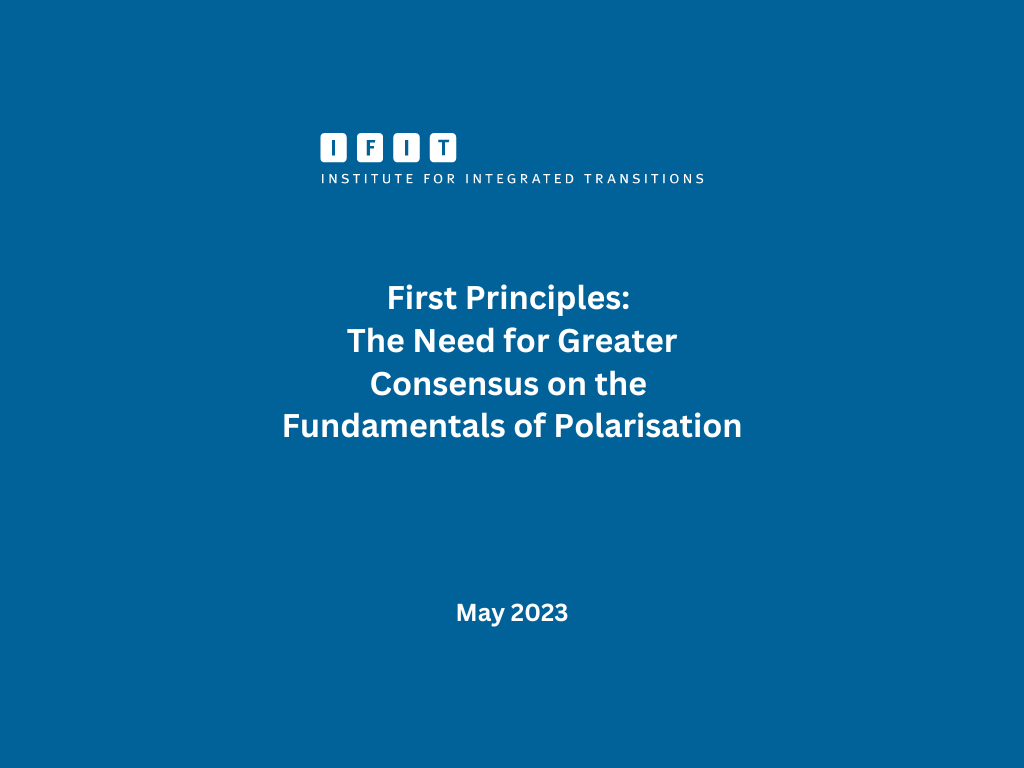Expert Team: Global Initiative on Polarization
Dr. Ana Paula Hernández is a Mexican expert in peacebuilding and restorative justice. She has implemented peace and justice projects in more than 300 secondary schools in violence-affected areas throughout Mexico and worked with over 100,000 students, teachers, and principals to reduce levels of violence and achieve horizontal relationships, incorporating a gender perspective.
Currently, Ana Paula is part of a joint effort to strengthen municipal police in México and Latin America through mediation, negotiation, and alternative conflict resolution mechanisms. She designed and coordinates the Diploma in Peace Education and Human Rights at the Universidad Iberoamericana and the Memory and Tolerance Museum in Mexico. She is also the coordinator of the National Dialogue for Peace, which aims to establish the conditions for building peace in Mexico through an interdisciplinary and multi-sectoral approach to four central themes: social fabric, justice, security, and the prison system.
Ana Paula holds a Master’s degree in Human Rights from the Universidad Iberoamericana and a Ph.D. in Social Responsibility from the Universidad Anáhuac Mexico Norte. She has numerous publications on violence, democracy, human rights, and peace education.
You may also be interested in
Dr Sithembile Mbete is the Director of Programmes of Futurelect, a non-profit and non-partisan political training programme for emerging public leaders in Southern Africa. She is also a Senior Lecturer in the Department of Political Sciences at the University of Pretoria (UP) where she teaches international relations and South African politics. She serves on the Council of the Private Security Industry Regulatory Authority (PSiRA).
Sithembile was recently a visiting researcher at the African Leadership Centre at King’s College London. She has a DPhil in International Relations from the Univ. of Pretoria and she completed her undergraduate, honours and masters degrees at the Univ. of Cape Town. In 2014 she was a visiting scholar at the Dept. of Political Science and Balsillie School of International Affairs at the Univ. of Waterloo in Canada.
Sithembile comments frequently in the media on a range of issues in South African politics. She is Kaya FM’s resident political analyst and has a regular slot on David O’Sullivan’s breakfast show. Sithembile has been part of eNCA’s team of analysts for the ANC’s 2017 elective conference, the State of the Nation Address in 2018 and 2019, and the 2019 National and Provincial election. She has also worked for the Presidency of South Africa as a researcher in the secretariat of the National Planning Commission. She contributed to the drafting of the National Development Plan in the areas of public service reform, anti-corruption policy and community safety.
You may also be interested in
Murat Somer is a Professor of Political Science and International Relations at Özyeğin University, Istanbul.
Murat is a scholar of comparative polarization and depolarization, democratic erosion, democratization, and opposition strategies during regime changes, religious and secular politics, ethnic conflicts and the Kurdish Question.
His recent publications include Polarizing Polities: A Global Threat to Democracy (co-edited with Jennifer McCoy) and Return to Point Zero: The Turkish-Kurdish Question and How Politics and Ideas (Re)Make Empires, Nations and States. He also has been a volunteer and advisor for civil society and political parties, participating in efforts to overcome severe polarization, autocratization and human rights violations in Turkey and contributing to domestic and international media.
Previously, he served as assistant, associate and full professor at Koç University Istanbul, and held visiting positions such as Mellon post-doctoral fellow at the University of Washington, Democracy and Development Fellow at Princeton University, and Visiting Scholar and Lecturer at universities such as Stanford, Harvard and Stockholm. He is a research affiliate of the Democracy Institute at Central European University.
Born in Diyarbakır and raised in Istanbul, Murat holds a bachelor’s degree in economics from Boğaziçi University Istanbul, and a master’s degree in economics and a PhD in political economy and public policy from the University of Southern California. He is the proud father of Nazım Erenay.
You may also be interested in
Hilary Pennington is Ford Foundation’s executive vice president of programs. She oversees all of our programs globally, working closely across programs and offices to ensure strategic, meaningful, and well-aligned global grant making. She also oversees the foundation’s BUILD program, and the Office of Strategy and Learning. Before assuming her current role, she served as the foundation’s vice president for Education, Creativity, and Free Expression.
A national expert on postsecondary education and intergenerational change, Hilary joined the foundation in 2013. Earlier, she was an independent consultant whose clients included the Next American University project of the New America Foundation and Arizona State University. She also led the Generations Initiative, a project funded by national foundations to develop effective responses to the dramatic demographic shifts occurring in the United States.
Between 2006 and 2012, Hilary served as director of education, postsecondary success, and special initiatives at the Bill and Melinda Gates Foundation, where she guided grant programs across the country and worldwide. Before joining Gates, she was a senior fellow at the Center for American Progress and president and CEO of Jobs for the Future, a research and policy development organization she co-founded. In 22 years with JFF, Hilary helped the organization become one of the most influential in the country on issues of education, youth transitions, workforce development, and future work requirements. She also served on President Bill Clinton’s transition team and as co-chair of his administration’s presidential advisory committee on technology.
Hilary serves on the boards of Bard College, the Center for Effective Philanthropy, and Giving Tuesday, and she is a member of the Trinity Church Vestry. She is a graduate of the Yale School of Management and Yale College, and she holds a graduate degree in social anthropology from Oxford University and a master’s degree in theological studies from the Episcopal Divinity School. In 2000, she was a fellow at Harvard’s Kennedy School of Government.
john a. powell is an internationally recognized expert in the areas of civil rights, civil liberties, structural racism, housing, poverty, and democracy. He is the Director of the Othering & Belonging Institute at the University of California, Berkeley, a research institute that brings together scholars, community advocates, communicators, and policymakers to identify and eliminate the barriers to an inclusive, just, and sustainable society and to create transformative change toward a more equitable world.
john holds the Robert D. Haas Chancellor’s Chair in Equity and Inclusion and is a Professor of Law, African American Studies, and Ethnic Studies at UC Berkeley. Previously, he was the Executive Director of the Kirwan Institute for the Study of Race and Ethnicity at The Ohio State University where he also held the Gregory H. Williams Chair in Civil Rights & Civil Liberties at the Moritz College of Law.
He regularly appears in the major media offering expert insights on a host of issues. Recent appearances include NPR and WYNC’s On The Media in an episode about free speech and the constitution, Last Week Tonight with John Oliver in an episode about housing segregation, CBS Evening News where john weighed in on police reform and the Chauvin trial.
john has written extensively on a number of issues including structural racism, racial justice, concentrated poverty, opportunity-based housing, voting rights, affirmative action in the United States, South Africa and Brazil, racial and ethnic identity, spirituality and social justice, and the needs of citizens in a democratic society. He is the author of several books, including his most recent work, Racing to Justice: Transforming our Concepts of Self and Other to Build an Inclusive Society.
The founder and director of the Institute on Race and Poverty at the University of Minnesota, john has also served as Director of Legal Services in Miami, Florida and was the National Legal Director of the American Civil Liberties Union, where he was instrumental in developing educational adequacy theory.
john led the development of an “opportunity-based” model that connects affordable housing to education, health, health care, and employment and is well-known for his work developing the frameworks of “targeted universalism” and “othering and belonging” to effect equity-based interventions.
john has lived and worked in Africa, where he was a consultant to the governments of Mozambique and South Africa, and has also worked in India and Brazil. He is one of the co-founders of the Poverty & Race Research Action Council and serves on the board of several national and international organizations. john has taught at numerous law schools including Harvard and Columbia University.
You may also be interested in
Rima Maktabi is a communications professional with over 20 years’ experience in television. She is currently UK bureau chief for Al Arabiya, covering international news and interviewing top leaders and decision-makers. War torn Syria, Iraq and ISIS have been at the heart of Maktabi’s news coverage from the frontlines of Aleppo, Idlib, Daraa and Mosul. Prior, Maktabi worked at CNN as an anchor and reporter covering major news stories across the Middle East, including the Arab Spring revolutions in Tunisia, Egypt and Bahrain. She was also the host of CNN’s renowned show “Inside the Middle East”. Maktabi started her career in media in her home country Lebanon as a student, beginning with Lebanese Future TV where she spent 10 years and established her career in media and journalism. Maktabi has received numerous accolades for her work, such as the Mohammed Bin Rashed Al Maktoum award for her July war coverage in 2006. She has an MA in International Affairs and BA in Communication Arts from the Lebanese American University in Beirut (LAU).
You may also be interested in
Dabesaki Mac-Ikemenjima is a program officer at Ford Foundation’s office for Western Africa in Lagos. He currently works at the intersection between gender and natural resources, and manages grantmaking that integrates women and girls, disability and youth lenses across these two domains. This work actively promotes the inclusion of the voices of diverse groups and perspectives.
Dabesaki has had extensive experience working on youth issues from research, policy and program perspective across Africa and beyond. Prior to joining Ford, he was a policy consultant to various international non-governmental, governmental, and multilateral institutions. He was an embedded consultant at the African Union Commission for an extended period and supported the development of regional frameworks and strategies, as well as providing technical assistance to its member countries. He was also the executive director of Development Partnership International, a youth-focused organization that worked to promote youth leadership in addressing health and education challenges in Nigeria and Zambia.
Dabesaki holds a PhD in international development and MA in development studies from the University of East Anglia, and a Bachelor’s degree in Educational Psychology from the Rivers State College of Education. He was previously an external research associate at the University of East Anglia and is a visiting researcher to the University of Witwatersrand.
You may also be interested in
Usman Hamid is the Chairperson of the Public Virtue Institute, as well as the Director of Amnesty International Indonesia. He is also a lecturer at Indonesia Jentera School of Law and a human rights lawyer and expert council at the Indonesian Bar Association (PERADI-RBA).
Usman was coordinator of KontraS, the Commission for Missing Persons and Victims of Violence, an organisation that advocates for victims of State abuse in Indonesia. In 2004 he was appointed a member of the Presidential Fact-Finding Team that investigated the 2004 murder of prominent Indonesian human rights defender Munir Said Thalib.
Usman went on to a fellowship at Nottingham University in 2009. He served as an expert adviser to the International Center for Transitional Justice, Jakarta office, from 2010 until 2012. In 2011 Usman was appointed to the Presidential Working Unit for the Supervision and Management of Development, where he reviewed the policy on Indonesia’s Human Rights Nation Plan of Action of 2011–2014. In 2012 he co-founded Public Virtue Institute and the Indonesian Branch of Change.org, the world’s largest online petition platform.
He has been a visiting scholar at Columbia University (2003) and held a fellowship at Nottingham University (2009).
You may also be interested in
Javier Ciurlizza is Ford Foundation’s director for the Andean Region, overseeing all grantmaking in the region from Ford’s office in Bogotá, Colombia.
Before joining the foundation in 2016, Javier served as program director for Latin America and the Caribbean at the International Crisis Group. He led efforts to address armed, social, and political conflicts in Bolivia, Colombia, Ecuador, Guatemala, Mexico, Venezuela, and Haiti. Previously, he worked as Americas director for the International Center for Transitional Justice.
Earlier, Javier served as executive secretary of the Truth and Reconciliation Commission for Peru, and as director of the Institute of Democracy and Human Rights at the Universidad Católica. He was appointed the chief of cabinet to the Peruvian Ministry of Justice and served as special adviser for the Ministry of Foreign Affairs. He also guided truth commissions and judiciary processes in Paraguay, Kenya, Indonesia, and Liberia. He started his professional career closely linked to the Peruvian human rights movement, as assistant to the executive secretary of the National Coordinating Committee on Human Rights and later as secretary general of the Andean Commission of Jurists.
Javier holds a master’s degree in international political economy from the University of Warwick in England, and a law degree from the Pontificia Universidad Católica of Peru.
You may also be interested in
Rachel Brown the Founder and Executive Director of Over Zero, an organization that works to build resilience to identity-based violence and other forms of group-targeted harm. She is a recognized expert on confronting hateful and dangerous rhetoric and her work for the past decade has focused on using communication to prevent violent conflict around the world.
Rachel authored Defusing Hate: A Strategic Communication Guide to Counteract Dangerous Speech and was a Fellow at the U.S. Holocaust Memorial Museum’s Simon Skjodt Center for Prevention of Genocide. She also founded and was CEO of Sisi ni Amani-Kenya (SNA-K), an internationally recognized organization that pioneered new strategies to build local capacity for violence prevention and civic engagement in Kenya. Rachel has provided training and strategy support to organizations and programs in the U.S., Europe, Asia, and Africa and consulted for organizations including the World Bank, DAI, and Internews.
Her work has been profiled at conferences, events, and publications globally, including CBS, PopTech, the United States Institute for Peace, United States Airforce Academy, UN Department of Political and Peacebuilding Affairs, Universities across the U.S., and the Stavros Niarchos Foundation International Conference on Philanthropy.
You may also be interested in









